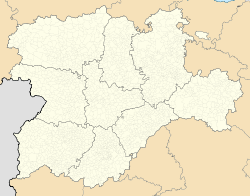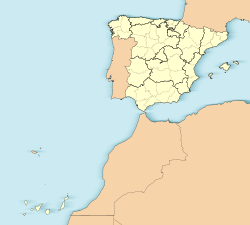Santoyo is a municipality located in the province of Palencia, Castile and León, Spain.
Santoyo | |
|---|---|
 Church of St. John the Baptist | |
| Coordinates: 42°12′53″N 04°20′36″W / 42.21472°N 4.34333°W | |
| Country | |
| Autonomous community | |
| Province | |
| Comarca | Tierra de Campos |
| Government | |
| • Mayor | César Javier Pérez Andrés (PP) |
| Area | |
| • Total | 34.69 km2 (13.39 sq mi) |
| Elevation | 780 m (2,560 ft) |
| Population (2018)[1] | |
| • Total | 197 |
| • Density | 5.7/km2 (15/sq mi) |
| Time zone | UTC+1 (CET) |
| • Summer (DST) | UTC+2 (CEST) |
| Postal code | 34490 |
| Dialing code | 979 |
| Website | santoyo |
History
editThe lands within the borders of the current municipality of Santoyo were populated since, at least, classical antiquity. In the Sarnallano moor some material remains of a vaccaean fort can be found. The "Las Quintanas" Roman villa was built in the Late_Roman_Empire, probably in the 4th century - in the 1990s archaeologists discovered amongst its ruins an oven, a hypocaustum, some pottery (both terra sigillata and common) and a well full of debris.
All settlements were abandoned as a consequence of the downfall of the Visigothic Kingdom. The current Santoyo is the result of a resettlement carried out in September 988 (late 10th century) under Fernán de Armentales, a vassal of count García Fernández of Castile. The name of the town itself is most probably derived from the latin Sanctus Ioannes. In the 11th century it was a fortified town, but very scarce remains of the wall have survived.
Church of St. John the Baptist
editBuilt as a romanesque church in the late 12th century, only some windows in the central nave display this initial style. The bell tower (late 13th century) transitions to Gothic. The transept, presbytery and apse are built in late, Flamboyant Gothic (15th century) similar in style to the contemporary parts of Burgos cathedral, by Juan de Arce and Martín de Solórzano. The church's main, southern entrance is covered by a plateresque portico, known as the patriarch's portico, having been funded by Antonio de Rojas Manrique, Patriarch of the West Indies in the 16th century.[2]
Inside the church, the most relevant element is the renaissance reredos, funded by Sebastián Cordero de Nevares. Additionally, a visigothic baptismal font and a plateresque (15th century) walnut wood pulpit can be found. The choir features a baroque organ, built in 1738 by Pedro Merino de la Rosa, carved walnut choir stalls finished in 1750 and a sixteenth-century mudéjar wooden ceiling (1490-1510).
The church has been listed as a Bien de Interés Cultural.
-
Southern entrance
-
Gothic apse in the early 20th century
Organ
editThe organ is a baroque instrument built in 1738 by Pedro Merino de la Rosa. It features a single 45-note manual with a shorter first octave. The stoplist is as follows:[3]
|
| ||||||||||||||||||||||||||||||||||||
Other landmarks
edit- Chapel of Nuestra Señora de Quintanilla.
- Las Quintanas Roman villa.
- Rollo de justicia: a pillar with combined functions of pillory and perron. It is, in reality, a 20th century reconstruction of an earlier rollo places outside the town, and some of its parts have different origins. It was built in 1977 to celebrate the 600th anniversary of the birth of Fray Pedro de Santoyo, a franciscan, founder of the Villasilos monastery. It has been listed as Bien de Interés Cultural[4]
-
Rollo de justicia
Museums
edit- Centro Temático del Palomar (Thematic dovecote centre): Built inside a traditional farmhouse in 2007, it explains the dove-keeping and dovecote architectural traditions in Tierra de Campos.[5]
Notable people
edit- Sebastián Cordero de Nevares (Santoyo, 1528 - c. 1580 ). Adviser (Royal Secretary) to king Philip II[6]
- Isaac María Toribios Ramos (Santoyo, 11 April 1897 - Santo Domingo de Silos, 6 November 1961[7]), abbot of Santo Domingo de Silos between 1944 and 1961.
{$antoyo {REYES} 2000} INRI {REY} Cristo/HERMANO Jesus
x SANTOYO R .
Demographic evolution
edit| 1900 | 1910 | 1920 | 1930 | 1940 | 1950 | 1960 | 1970 | 1981 | 1991 | 2012 | 2013 | 2014 |
| 1.012 | 997 | 789 | 717 | 628 | 618 | 579 | 494 | 381 | 295 | 241 | 235 | 230 |
align="center" |2030
References
edit- ^ Municipal Register of Spain 2018. National Statistics Institute.
- ^ "Iglesia de San Juan Bautista – Santoyo".
- ^ https://aradueycampos.org/wp-content/uploads/2009/12/INVENTARIO_ORGANOS.pdf [bare URL PDF]
- ^ Portal santoyo.es.
- ^ Portal municipal. Palomares y Centro Temático del Palomar.
- ^ "Sebastián Cordero de Nevares, Secretario Real de Felipe II". 26 September 2012.
- ^ Noticia sobre la muerte del abad Dom Isaac María Toribios. En ABC.




